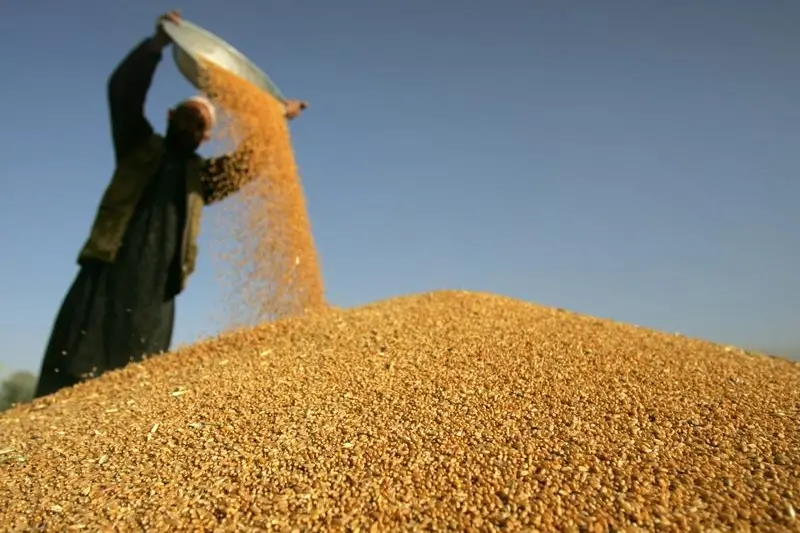PHOTO
09 January 2017
(Update: Last paragraph attributed to Egyptian analyst Nader Noor El Din and correct spelling of the EAB chairman's name)
By Mohamed Elagamy
Egypt has restructured a government entity responsible for development of the country’s agriculture sector in a move expected to help secure more international loans and financial aid for the vital industry, a top official said.
As the Arab world’s most populous nation with over 90 million people, the agriculture sector is crucial to Egypt’s economy. It contributes around 13.8 percent to the country’s gross domestic product (GDP), according to statistics released last November by the Egyptian Central Bank.
The sector, along with the wider economy, has struggled to recover from the political and economic turmoil resulting from the 2011 uprising which led to the ouster of President Hosni Mubarak after nearly three decades in power.
Last November, the government passed a law replacing the Principal Bank for Development & Agricultural Credit (PBDAC), which was founded in the 1930s, with the new Egyptian Agricultural Bank (EAB).
“The new legal changes will allow the bank to get grants and financial aids from regional and international organisation,” Elsayed Mohamed Marzoukq Elkosayer, the chairman of the board of directors of EAB, told Zawya in an interview late last month.
The PBDAC had failed to secure a $500 million loan from the World Bank in 2013 because it was under the authority of the government, and not the central bank, and because of the way the entity was structured.
EAB will be supervised by the Egyptian Central bank and will have a unified board of directors that, according to Elkosayer, will include economic, legal, financial and agricultural experts. This is in contrast to the three boards that made decisions at PBDAC.
Elkosayer said the new bank would also play a vital role in developing the role of small and medium-size companies in the agriculture sector.
The sector has suffered from a lack of lending opportunities for some time, with loans to farmers accounting for just 0.8 percent of all loans in the country, according to a Central Bank report.
“The bank (EAB) has a wide customer base of farmers, of no less than 3 million, who represent around 25 to 30 percent of the total customer base of the banking sector,” Elkosayer said, adding that he hopes the percentage will rise to 40 percent in 2017.
The agriculture sector is also expected to benefit from the floatation of the Egyptian pound last November, analyst Nader Nour El Din, professor in Cairo University’s faculty of agriculture, told Zawya in an interview last month.
Previously, many suppliers were operating at a loss as the retail price of their goods did not cover production costs. However, the currency floatation has resulted in the price of many agricultural produce surging by up to 50 percent, helping to lift many farmers out of the red.
(Writing by Yasmine Saleh, Editing by Shane McGinley)
© Zawya 2017
(Update: Last paragraph attributed to Egyptian analyst Nader Noor El Din and correct spelling of the EAB chairman's name)
By Mohamed Elagamy
Egypt has restructured a government entity responsible for development of the country’s agriculture sector in a move expected to help secure more international loans and financial aid for the vital industry, a top official said.
As the Arab world’s most populous nation with over 90 million people, the agriculture sector is crucial to Egypt’s economy. It contributes around 13.8 percent to the country’s gross domestic product (GDP), according to statistics released last November by the Egyptian Central Bank.
The sector, along with the wider economy, has struggled to recover from the political and economic turmoil resulting from the 2011 uprising which led to the ouster of President Hosni Mubarak after nearly three decades in power.
Last November, the government passed a law replacing the Principal Bank for Development & Agricultural Credit (PBDAC), which was founded in the 1930s, with the new Egyptian Agricultural Bank (EAB).
“The new legal changes will allow the bank to get grants and financial aids from regional and international organisation,” Elsayed Mohamed Marzoukq Elkosayer, the chairman of the board of directors of EAB, told Zawya in an interview late last month.
The PBDAC had failed to secure a $500 million loan from the World Bank in 2013 because it was under the authority of the government, and not the central bank, and because of the way the entity was structured.
EAB will be supervised by the Egyptian Central bank and will have a unified board of directors that, according to Elkosayer, will include economic, legal, financial and agricultural experts. This is in contrast to the three boards that made decisions at PBDAC.
Elkosayer said the new bank would also play a vital role in developing the role of small and medium-size companies in the agriculture sector.
The sector has suffered from a lack of lending opportunities for some time, with loans to farmers accounting for just 0.8 percent of all loans in the country, according to a Central Bank report.
“The bank (EAB) has a wide customer base of farmers, of no less than 3 million, who represent around 25 to 30 percent of the total customer base of the banking sector,” Elkosayer said, adding that he hopes the percentage will rise to 40 percent in 2017.
The agriculture sector is also expected to benefit from the floatation of the Egyptian pound last November, analyst Nader Nour El Din, professor in Cairo University’s faculty of agriculture, told Zawya in an interview last month.
Previously, many suppliers were operating at a loss as the retail price of their goods did not cover production costs. However, the currency floatation has resulted in the price of many agricultural produce surging by up to 50 percent, helping to lift many farmers out of the red.
(Writing by Yasmine Saleh, Editing by Shane McGinley)
© Zawya 2017





















